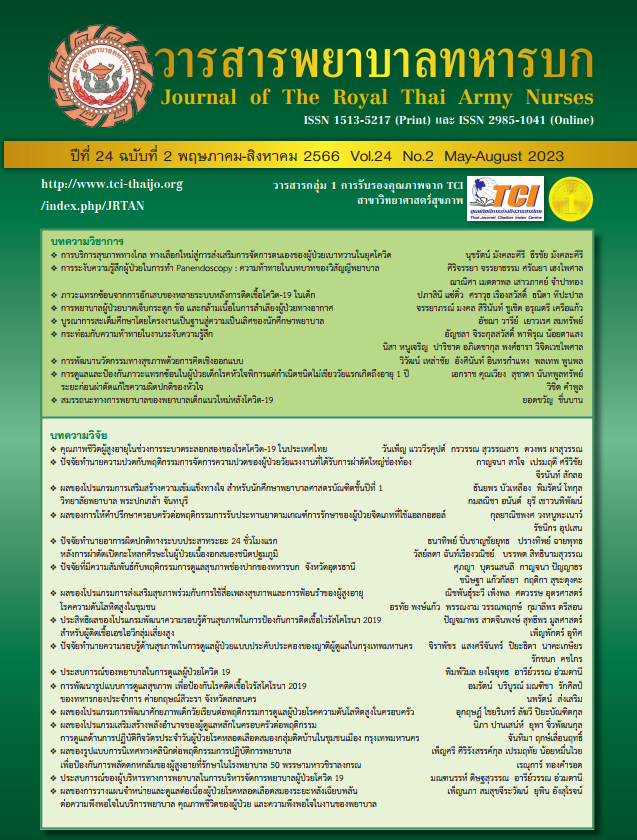Predicting Factors of Palliative Care Health Literacy among Family Caregivers in Bangkok Metropolis
Keywords:
Health literacy, Palliative care, Interpersonal patient and family caregiver, Social support, Family caregiverAbstract
To study the predictive power of the factors can help investigate the factors that may influence caregivers’ palliative care health literacy in Bangkok. The 106 family caregivers were selected using multi-stage sampling techniques and simple sampling. The researchers collected the data using questionnaires developed by the researchers, including the general information of family caregivers, palliative care health literacy (α= 0.897), interpersonal relationship (α = 0.822), and social support questionnaires (α = 0.909) Data were analyzed by descriptive statistics, which consist of frequency, percentage, mean, and standard deviation, as well as inferential statistics. Applying Pearson’s rank correlation and multiple regression The research findings, Education, interpersonal patient, family caregiver relationships, and social support were found to be statistically significant positive correlates of palliative care health literacy among family caregivers, predicting 24.8% (R2 =.248 df = 4 F = 8.335 p<.05). And both Education and social support could predict palliative care health literacy (β = .230, p < .05 และ β = .364, p < .001 respectively)
Downloads
References
World Health Organization. Palliative Care: symptom management and end-of-life care.
WHO Publications. 2019.
Division of Public Health Nursing. Statistics of the family caregiver in Bangkok. 2020. (In Thai).
Pairojkool S. Palliative Care for Thais. Journal of National Health Security Office. 2019; (8): 4-5. (In Thai).
Kanchanachari O, Sirapo-ngam Y, Monkong S. Roles and Needs of Caregivers for Patients
with End of Life in a Specific Setting for Palliative Care. Rama Nurs J. 2017; 23(3): 328-343. (In Thai).
Yuen E.YN, Dodson S, Batterham R, Knight T, Chirgwin J, and Livingston P. Development
of a conceptual model of cancer caregiver health literacy. Eur. J. Cancer Care. 2018; 25: 294-306.
Nutbeam D. The evolving concept of health literacy. Social Science & Medicine. 2008;
(12): 2072-2078.
Division of Health Education, Ministry of Public Health. Strengthening and assess health
literacy and health behaviors. (Revised Edition). Nonthaburi: Ministry of Public Health. 2018. (In Thai).
Madican K, Oba N, Supametapor P. Factors Related to Health Literacy in Patients with
Uncontrolled Type 2 Diabetes. Journal of Nursing and Health Sciences.2020; 14(1): 38-53. (In Thai).
Anon S, Chanandchidadussadee T and Wannarat L. Factors Influencing Health Literacy
among Family Caregivers of Chronic Disease Patients in Community. Journal of Nursing and Health Care. 2019; 37(2): 55-62. (In Thai).
Chang H.L, Li F.S. and Lin C.F. Factor influencing implementation of shared medical
decision making in patient with cancer. Patient Preference and Adherence. 2019; 13: 1995-2005.
Kanthawee P, Pongpanich S. The study of health literacy among elderly people, Pa-teung
Sub-district, Mae Chan District, Chiang Rai Province. Chiang rai Medical Journal. 2019; 11(1): 73-83. (In Thai).
Auttama N. and Seangpraw P. Factors Predictor Health Literacy among Older Adults
with Risk Hypertension Disease, Phayao Province. Journal of Health Education. 2019; 42(2): 75-85. (In Thai).
Sullivan H. S. The interpersonal theory of psychiatry. New York: Norton, 1953.
Buttapim S, Wanitkun N, Sindhu S, Kasemsarn C. Predictive factors of patients’
quality of life three months after post coronary artery bypass graft surgery. Thai Journal of Cardio-Thoracic Nursing. 2018; 29(2): 127-140. (In Thai).
Eileen K. Fry-Bowers. The Association of Health Literacy, Social Support, Self-Efficacy and
Interpersonal Interactions with Health Care Providers in Low-Income Latina Mothers. J Pediatr Nurs. 2014 Jan; 29(4): 309–320. doi:10.1016/j.pedn.2014.01.006
Mancuso J.M. Health literacy: a concept/dimensional analysis. Nursing & Health Sciences.
, 10(3): 248-255.
Zimet GD, Dahlem NW, Zimet SG, Farley GK. The multidimensional scale of perceived
social support. J Pers Assess. 1988, 52(1): 30-41.
Wongpakaran T, Wongpakaran N, Sirirak T, Arunpongpaisal S, Zimet G. Confirmatory factor
analysis of the revised version of the Thai multidimensional scale of perceived
social support among the elderly with depression. Aging & Mental Health. 2018; 22(9): 1149-1154.
Yongnan Li, Lanying Hu BS, Xin'e Mao MD, Yijing Shen MD, Huiping Xue MD, Ping Hou MD,
and Yongbing Liu. Health literacy, social support, and care ability for caregivers of dementia patients: Structural equation modeling. Geriatric Nursing. 2020; 41: 600-607.
Sang-Un Park et al. Factors Influencing Caregiver Reaction among Family Caregivers for
Persons with Cancer. Journal of Digital Convergence. 2019; 17(3): 291-304.
Erikson EH, Erikson JM, Kivnick HQ. Vital involvement in old age. New York: Norton. 1986.
Choothong C. The relationship between health literacy, health behaviors and accessing to
universal coverage scheme among care giver elderly with co-morbidity. Journal of Nursing Division. 2020; 47(1): 61-75. (In Thai).
Norasing M, Thanomphan S. Health literacy and health behavior in patients with uncontrolled
blood sugar level or blood pressure: a case study of Nakornping hospital, Chiang Mai. Journal of Nakornping Hospital. 2019; 10(1): 36-50. (In Thai)
Manganello J.A. Health literacy and adolescents: a framework and agenda for future
research. Health Education Research. 2008; 23(5): 840-847.
Maiphom S, Leemingsawat W. Health literacy of caregivers of children with epilepsy. Journal of Sports Science and Health. 2020; 21(2): 269-282. (In Thai)
Huei-Lan Chang, Fang-Shan Li and Chiou-Fen Lin. Factors Influencing Implementation
Of Shared Medical Decision Making In Patients With Cancer. Patient Preference and Adherence. 2019; 13: 1995-2005.
Kaewphanna S, Wirojratana V, Chanruangvanich W. The relationships between patient’s
health status, mutuality, preparedness and caregiver role strain in caregivers of older
persons with advanced cancer receiving palliative care. Journal of The Royal Thai Army
Nurses. 2020; 21(1): 183-192. (In Thai)
Wittenberg E., Goldsmith J. V., Ferrell B. and Ragan S. L. Promoting Improved Family Caregiver
Health Literacy: Evaluation of Caregiver Communication Resources. Psycho-oncology. 2017; 26(7): 935-942.
Wittenberg E., Goldsmith J. V. and Kerr A. M. Variation in health literacy among family
caregiver communication types. Psycho-Oncology. 2019; 28: 2181-2187.
Downloads
Published
How to Cite
Issue
Section
License
Copyright (c) 2023 Journal of The Royal Thai Army Nurses

This work is licensed under a Creative Commons Attribution-NonCommercial-NoDerivatives 4.0 International License.
บทความหรือข้อคิดเห็นใดใดที่ปรากฏในวารสารพยาบาลทหารบกเป็นวรรณกรรมของผู้เขียน ซึ่งบรรณาธิการหรือสมาคมพยาบาลทหารบก ไม่จำเป็นต้องเห็นด้วย
บทความที่ได้รับการตีพิมพ์เป็นลิขสิทธิ์ของวารสารพยาบาลทหารบก
The ideas and opinions expressed in the Journal of The Royal Thai Army Nurses are those of the authors and not necessarily those
of the editor or Royal Thai Army Nurses Association.






